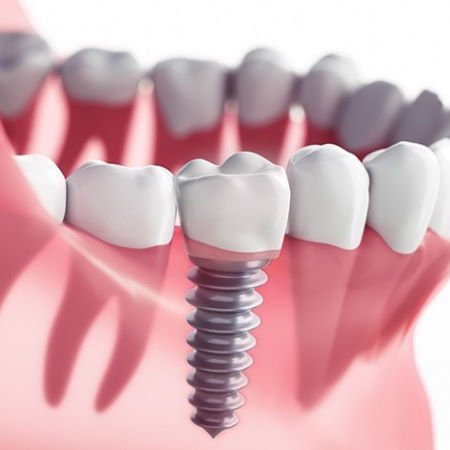If you’ve been exploring teeth replacement options, there’s no doubt you’ve heard about dental implants. With a success rate of over 95 percent, implants are considered the longest-lasting, most reliable teeth replacement solution. But do they need to be replaced? And if so, how often? Our team at Kreeb Family Dental is here to answer these questions so you can make an informed decision.
Anatomy of a Dental Implant
Before we explore the lifespan of a dental implant, let’s take a look at how an implant works. There are three primary components:
- Implant post: This is the dental implant itself. Typically manufactured from surgical-grade titanium, the implant post is placed directly into the jawbone, where it will ultimately fuse to the tissue – a process known as osseointegration.
- Abutment: Once the implant has healed, another post is added. This connector extends slightly beyond the gumline and serves as an anchor for the restoration.
- Dental crown: After the abutment is in place, the crown can be added. It can either be bonded into place using a dental cement or attached using screw-retention.
It’s important to note that the abutment and crown are generally more vulnerable to damage than the implant itself.
Lifespan of a Dental Implant
When maintained with proper hygiene and checkups, dental implants can last a lifetime. The crown attached to the implant will generally need replaced every 15 to 20 years, although they can last for several decades in some cases. Compared to other teeth replacement options, dental implants are the most cost-effective treatment overall. While they may cost more upfront, they last much longer than bridges and dentures, saving you a tremendous amount of time, worry, and money in the future.
Maintaining Your Dental Implants
Fortunately, maintaining implants doesn’t usually require any more care than your natural teeth. That being said, here are some tips and tricks to help keep your implant in optimal condition:
- Brush at least twice a day. Regular brushing removes plaque, tartar, and other debris. Brush two to three times a day, for two minutes each time. Be thorough, and don’t forget to brush the gumline.
- Floss once daily. Flossing is just as important as brushing. It’s essential for removing food particles and bacteria from between the teeth. Talk to you dentist about flossing tools and techniques to keep your implant clean and healthy.
- Use an antibacterial mouthwash. When combined with regular brushing and flossing, antibacterial mouth rinses help reduce cavities and gingivitis.
- Visit your dentist regularly. Many patients can maintain optimal oral health with 6-month cleanings. Some require more frequent visits, especially those who are prone to decay and gum disease. Talk to your dentist or hygienist about a cleaning schedule that’s right for you.
Can Dental Implants Fail?
Implants are long-lasting and reliable when placed correctly. But there are certain risk factors that can cause an implant to fail:
- Gum disease: While dental implants are impervious to decay, they are still vulnerable to gingivitis and periodontitis. This is another reason why routine dental cleanings are essential.
- Bruxism: Chronic grinding or clenching places undue stress on implants. Over time, this can cause them to fail. If you suffer from bruxism, ask your dentist about a custom night guard. This appliance can protect your natural teeth and implants from excessive bite pressure.
- Diabetes: Implants are actually a great option for individuals with diabetes, as long as the disease is controlled. It’s still a good idea to follow specific pre- and post-op guidelines to reduce the risk of complications.
- Cancer: Chemotherapy, radiation, and other immunosuppressive drugs can have a negative impact on implant success.
Learn More About Dental Implants Today
If you’re considering implants as a teeth replacement option, schedule a consultation at our practice to learn more. You can call us at 704-875-7200 or contact us online anytime.
